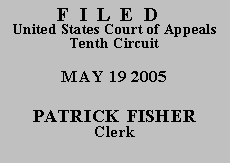

|
BRIAN ASHWORTH, |
|
Before BRISCOE, LUCERO, and MURPHY, Circuit Judges.
On January 10, 2003, Ashworth pleaded guilty to one count of lewd molestation. Pursuant to the terms of a plea agreement, a second charge of lewd molestation was dismissed. He was sentenced to a thirteen-year term of imprisonment. Ashworth did not seek to withdraw his guilty plea and he did not file a direct appeal. He did, however, file a state post-conviction application on November 3, 2003. Ashworth asserted several ineffective assistance of counsel claims in addition to a claim that the trial court lacked jurisdiction to accept his plea because it did not hold a preliminary hearing after a charge was added to the information. The state district court denied Ashworth's post-conviction application, relying on Oklahoma's procedural default rule. See Okla Stat. tit. 22, § 1086. The denial of post-conviction relief was affirmed by the Oklahoma Court of Criminal Appeals.
Ashworth filed the instant § 2254 petition on February 12, 2004, raising the same ineffective assistance and jurisdictional claims raised in his state post-conviction application. The matter was referred to a magistrate judge who prepared a Report and Recommendation ("R&R") recommending that Ashworth's petition be denied. The R&R first addressed Ashworth's assertion that a jurisdictional claim cannot be subject to procedural default. It concluded, however, that the right to a preliminary hearing on an amended information can be waived by the failure to object. See Norton v. State, 43 P.3d 404, 408 (Okla. Crim. App. 2002). Thus, despite Ashworth's assertions, his claim did not implicate the trial court's jurisdiction and it was procedurally defaulted. The R&R further concluded that Ashworth had failed to show cause and prejudice to excuse the default and had also failed to demonstrate that the failure to review the merits of the defaulted claim would result in a fundamental miscarriage of justice. See Bousley v. United States, 523 U.S. 614, 622 (1998). The R&R then concluded that federal review of Ashworth's ineffective assistance claims was not barred by the procedural default. Although it reviewed the claims, it determined that they lacked merit.
Ashworth filed timely objections to the R&R and argued, in part, that he was not given an adequate opportunity to argue the merits of his ineffective assistance claims. The district court considered Ashworth's expanded arguments but concluded that the ineffective assistance claims lacked merit. Accordingly, the court denied Ashworth's § 2254 petition.
This court cannot grant Ashworth a COA unless he can demonstrate "that reasonable jurists could debate whether (or, for that matter, agree that) the petition should have been resolved in a different manner or that the issues presented were adequate to deserve encouragement to proceed further." Slack v. McDaniel, 529 U.S. 473, 484 (2000) (quotations omitted). In evaluating whether Ashworth has carried his burden, this court undertakes "a preliminary, though not definitive, consideration of the [legal] framework" applicable to each of his claims. Miller-El v. Cockrell, 537 U.S. 322, 338 (2003). Ashworth is not required to demonstrate that his appeal will succeed to be entitled to a COA. He must, however, "prove something more than the absence of frivolity or the existence of mere good faith." Id. (quotations omitted).
This court has reviewed Ashworth's application for a COA and appellate brief, the district court's order, and the entire record on appeal pursuant to the framework set out by the Supreme Court in Miller-El and concludes that Ashworth is not entitled to a COA. The district court's resolution of Ashworth's claims is not reasonably subject to debate and the claims are not adequate to deserve further proceedings. Accordingly, Ashworth has not "made a substantial showing of the denial of a constitutional right" and is not entitled to a COA. 28 U.S.C. § 2253(c)(2).
This court denies Ashworth's request for a COA and dismisses this appeal.
Entered for the Court
PATRICK FISHER, Clerk of Court
By
Deputy Clerk